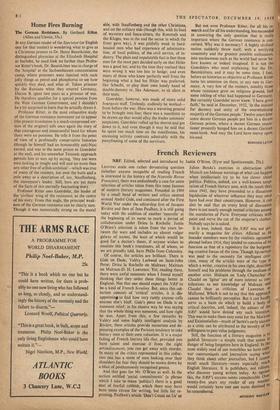French Reviewers
NRF. Edited, selected and introduced by Justin O'Brien. (Eyre and Spottiswoode, 25s.)
LEAVING aside one rather devastating question (whether anyone incapable of reading French
is interested in the history of the Nouvelle Revue Francaise), there was undoubtedly a case for some selection of articles taken from this most famous of modern literary magazines. Founded in 1909 by a small band of writers and critics centred around Andre Gide, and continued after the First World War under the editorship first of Jacques Riviere and then of Jean Paulhan, it is still going today with the addition of another `nouvelle' at the beginning of its name to mark a period of collaboration under Drieu la Rochelle. Justin O'Brien's selection is taken from the years be- tween the wars and includes an almost vulgar galaxy of names, the least of which would be good for a doctor's thesis, if anyone wishes to emulate this book's translators, all of whom, so we are proudly told, have PhDs from Columbia.
Of course, the articles are brilliant. There is Gide on Dada; Valdry Larbaud on Saint-John Perse; Drieu la Rochelle on Malraux; Malraux on Malraux-D. H. Lawrence. Yet, reading them, there were awful moments when I found myself thinking that they order these things better in England. Not that one should expect the NRF to be a kind of French Scrutiny. But, since this col- lection consists of 'critical' articles, it is dis- appointing to find how very rarely anyone calls anyone else's bluff. Gide's piece on Dada is an immense relief; in his elusive way he was saying that the whole thing was nonsense, and how right he was. Apart from this, a few remarks by Valery and some highly intelligent analysis by Riviere, these articles provide numerous and de- pressing examples of the Parisian tendency to take literary men at their own valuation. It is a major failing of French literary life that, provided you have talent and exercise it from the right arrondissement, you can get away with murder. In many of the critics represented in this collec- tion one has a sense of men looking over their shoulders for fear they should be mown down by a blast of posthumously recognised genius.
And that goes for Mr. O'Brien as well. In the section entitled 'social commitments' (a phrase which I take to mean 'politics') there is a good deal of fearful rubbish, which there may have been some excuse for writing, but little for re- printing. Paulhan's article `Don't Count on Us' or
Julien Benda's exercises in abstraction after Munich are hideous warnings of what can happen when intellectuals try to be too clever about
politics. Politics, indeed, are a well-known temp- tation of French literary men, with the result that,
since 1945, they have proceeded to a disastrous liquidation of whatever influence they may once have had over their countrymen. However, it can also be said that on every level of discussion there is not nearly enough mutual criticism among the mandarins of Paris. Everyone criticises with point and verve the cut of the emperor's clothes. Nobody says he is naked.
It is true, indeed, that the NRF was not pri- marily a magazine for critics. Affected as its founder members were by the vitalistic optimism abroad before 1914, they tended to conceive of its function as that of a repository for the burgeon- ing creative forces of the time. Though lip-service was paid to the necessity for intelligent criti- cism, many of the articles were of the type in which a writer, creative in his own right, describes himself and his problems through the medium of another artist. Malraux on 'Lady Chatterley. nr Claude( on `Igitur are of more interest as con- tributions to our knowledge of Malraux and Claudel than as criticism of Lawrence or Mallarme. Which is not to say that this approach cannot be brilliantly perceptive. But it can hardlY serve as a basis on which to build a body of critical doctrine, and, indeed, the editors of the NRF would have denied any such intention. This was to make them easy meat for the Marxists and Existentialists—much of Sartre's early succesg as a critic can be attributed to the novelty of hi' willingness to pass value judgments.
Still, the function of a literary magazine is publish literature—a simple truth that seems in danger of being forgotten here in England. In the most widely read of our monthlies we have cold; war communiqués and journalists saying wha, they think about other journalists, but I cannT recall much literature—more especially lunc° English literature. It is publishers, not editors; who discover young writers today. As again' this, the NRF's success seems considerable. Ove twenty-five years any reader of any number would certainly have met one name destined t° be remembered.
ANTHONY HARTLOIr

























 Previous page
Previous page